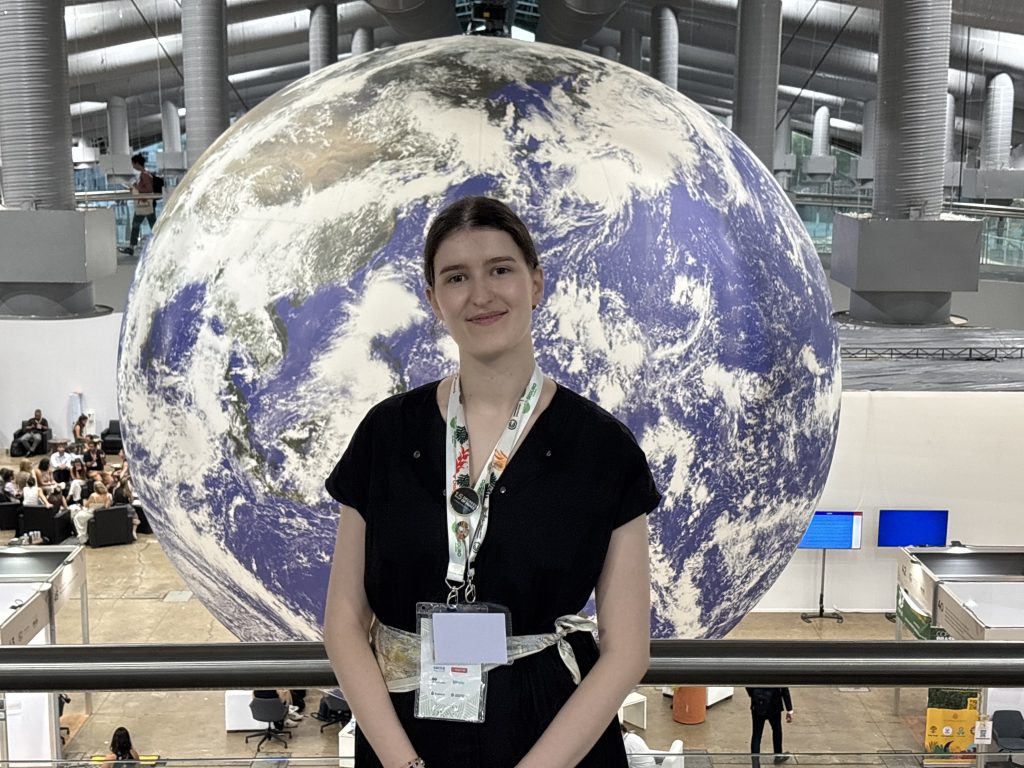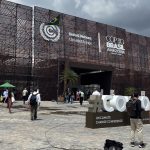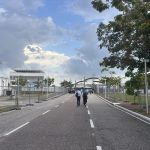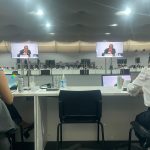
Author: Zvezdana Božović
RES Foundation is once again on the ground at the COP with its delegate, Zvezdana Božović. Among the many meetings, negotiations, and side-events, we tried to sift through the noise and highlight a few of the most memorable and interesting events from week 1 of COP30. Nestled at the very entrance to the Amazon, Belém serves as a constant reminder throughout the long hours spent in air-conditioned rooms of what is truly at stake. The hot and humid weather adds to the unique atmosphere, and the warm and open nature of the host city draws you in.
An interesting development this year is the expansion of event spaces outside the Blue and Green Zones, the official conference areas. One new space, Casa do Seguro, hosts panels and events and is organised by major insurance industry players. On the other side of the spectrum sits the Free Zone, an exciting space hosted in a public park and organised by local civil society organisations.
At the “Resilient Cities: Urban Planning for an Unpredictable Climate” panel organised by Allianz at the House of Insurance, industry leaders discussed challenges that climate change poses to infrastructure and the new ways insurance can help protect cities and communities from climate impacts, sharing a statistic that by 2050, nearly 70% of humanity will live in cities. When large natural catastrophes hit, economic losses can amount to up to 4% of GDP – but mainly in economies with low insurance coverage. As such, if deployed properly, insurance can act as a powerful tool of risk mitigation and protection against natural disasters. At the “Climate Change and the New Insurance Paradigm” event, speakers reiterated how the changing risk landscape demonstrates the evolution of sustainability risk over time and that we often respond only after challenges have escalated. This is why early coordinated action is key to prevent crises and build resilience.
At the event titled “Gender Dividend: How Outcomes-Based Finance Can Deliver Results for Women, Investors, and Climate” hosted by Goals House, speakers shared how empowering women through finance not only provides the space and the resources for women to grow, but that it also uplifts entire communities in which they live. At the preview screening of the documentary “1.5 degrees of Peace” hosted by Goals House, we had the opportunity to learn about the intersectionality of peace and climate issues worldwide through the poignant stories of two young activists from Hawai’i and Sudan. An interview with the filmmaker, Kasha Slavner, will be published soon on our website.
At the panel titled “Scaling Credit Enhancement for Private Capital Mobilisation”, panelists underlined how debt can be utilised to scale up solutions adapted to local contexts, including through debt swaps and debt conversion.
Our delegate, in her role as Partnerships lead for Generation Climate Europe, moderated an event titled “Financing the Future: Nordic Youth Voices on Climate Finance” hosted by the Nordic Pavilion. The event covered different perspectives on what the role of Nordic countries is in the scale-up of climate finance and the flow of finance and responsibilities between the Global North and Global South.
We also had the pleasure of attending the opening of the Clean Energy Futures Pavilion, as well as the launch of the WWF policy brief on tackling the insurance protection gap and the launch of the UNEP-FI Just Transition Report.
At the Evidence for Climate Action Pavilion, organised by the Technical Evaluation Reference Group of the Adaptation Fund, we had the chance to hear insights on best practices identified in the domain of climate adaptation projects, including in the Western Balkan region.
On the negotiation side, much is still left to be decided in week 2 and finance permeates much of the underlying uncertainties. Climate adaptation is in the spotlight this year, with the expected adoption the GGA (Global Goal on Adaptation) indicators, though adaptation finance in this area is still a point of contention. The work continues on the Baku to Belém Roadmap which aims to devise a way to meet the 1.3 trillion target set by the NCQG at COP29 in Baku last year, while the Loss & Damage fund negotiations are moving slowly. The COP30 Presidency is also promoting its flagship initiative – the Tropical Forest Forever Facility, which aims to leverage capital markets into preserving forests and stopping deforestation and degradation. On the mitigation side, the mitigation work programme (MWG) is still under discussion, and doubts in the capacity of present NDCs to meet the 1.5 target are increasing.
Exclusive photo gallery (photo credits to Zvezdana Božović):












